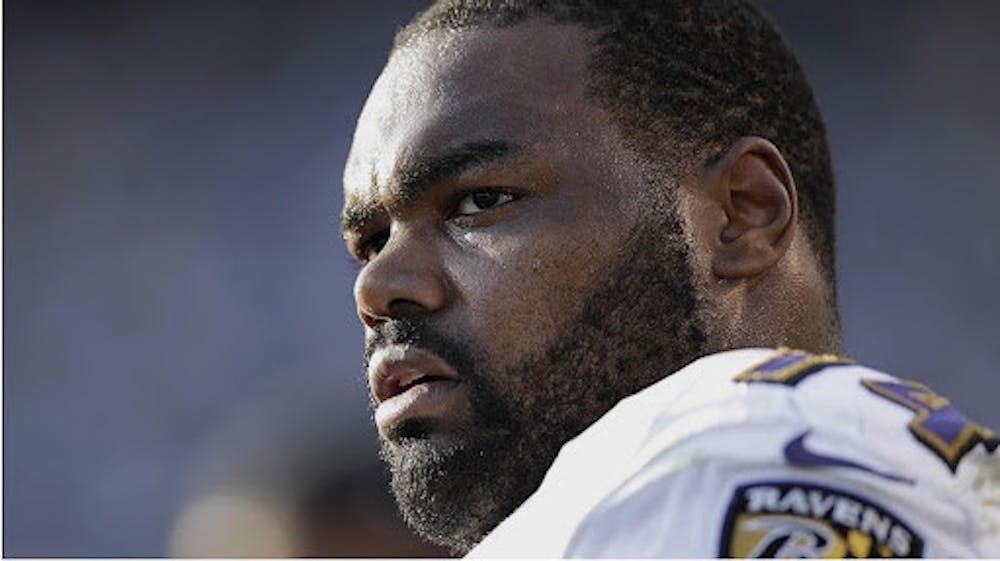By Riley Eisenbeil
Staff Writer
In recent weeks, shocking revelations have emerged regarding the once-celebrated relationship between former NFL star Michael Oher and the Tuohy family that took him in, famously portrayed in the 2009 film “The Blind Side.”
The movie portrayed the true story of Oher, a young Black man who was experiencing homelessness and had a difficult upbringing. His life took a turn for the better when he found support and a new family in the Tuohys, portrayed by Sandra Bullock and Tim McGraw. They opened their home to him, offering love and support, and together, they helped him fulfill his dream of becoming a professional football player.
“The Blind Side” presented a seemingly heartwarming narrative of a family’s compassion and the transformative power of mentorship. However, the recent disputes have cast a new light on this tale, raising questions about deception, exploitation and the true nature of their connection.
According to USA Today, Oher, 37, claims he just found out in February that he was never legally adopted by the family, but rather put in a conservatorship. Following this, on Aug. 15 he filed a 14-page court petition in hopes that the conservatorship would be dissolved after this “painful” realization, as he called it.
The very next day, the family’s legal team countered, insisting that Oher had been aware of this fact for years. Randall Fishman, one of the two Tennessee-based lawyers hired by the Tuohys, said that although Oher claimed he was unaware of this until recently, he actually acknowledged the conservatorship on three separate occasions in his 2011 autobiography titled, “I Beat The Odds: From Homelessness, to The Blind Side and Beyond,” as reported by The Today Show.
“It kind of felt like a formality, as I’d been part of the family for more than a year at that point,” Oher wrote in the book. “Since I was already over the age of eighteen … Sean and Leigh Anne would be named as my ‘legal conservators.’ They explained to me that it means pretty much the exact same thing as ‘adoptive parents,’ but that the laws were just written in a way that took my age into account.”
From this wording, it seems as though Oher did know about the conservatorship, but was unaware of what it actually meant or how it would affect him in the future. Oher’s attorney stated that he was falsely advised by the Tuohys that “the legal action to adopt [him] would have been called a ‘conservatorship’ but it was, for all intents and purposes, an adoption,” as reported by the New York Post.
While Oher felt blindsided after realizing the true power that a conservatorship held, the Tuohys insisted it was the best and only choice that they had.
Fishman noted that the conservatorship only happened in the first place so that Oher could attend the University of Mississippi, also known as Ole Miss, the alma mater of both Tuohy parents. In an interview with The Daily Memphian, Sean Tuohy explained that since he was an active promoter of the school, also known as a booster, the NCAA would only allow Oher to go to Ole Miss if he was legally “part of the family.”
“Michael was obviously living with us for a long time, and the NCAA didn’t like that,” Tuohy started. “…We contacted lawyers who had told us that we couldn’t adopt over the age of 18; the only thing we could do was to have a conservatorship.”
In an article by the New York Post, Oher’s attorney spoke more on the matter. He explained that at no point did the Tuohys inform him that they would have complete control over all of his contracts and business deals. Therefore, he did not understand that if the conservatorship was granted, he was signing away his right to make those decisions himself.
Oher’s attorney also noted that the Tuohy family continues to misrepresent themselves as Oher’s adoptive parents. He pointed out that the family still uses his name, pictures and life story to promote their website and their foundation called “Making It Happen,” which aims to “promote awareness, provide hope and improve the standard of living and quality of life for all the children fighting to survive,” as their mission statement says.
Critics have long noted the film’s focus on the Tuohy family, perpetuating the “white savior complex” trope. It implies that Oher’s success was primarily due to their intervention, overshadowing his inherent talent and hard work. Oher’s recent claims add a new layer to this critique, raising questions about the family’s true intentions and motivations throughout the whole process.
Now, 19 years after the conservatorship began, the Tuohy family says they intend to end their conservatorship for Oher, according to NPR. Although they are still denying the claims that he did not know, Fishman said, “If that’s what [Oher] wants to do, is terminate it, then we’re more than glad to do so.”
Even as they now announce their intent to end the conservatorship, the legal and ethical complexities persist, casting a permanent shadow over the story.







